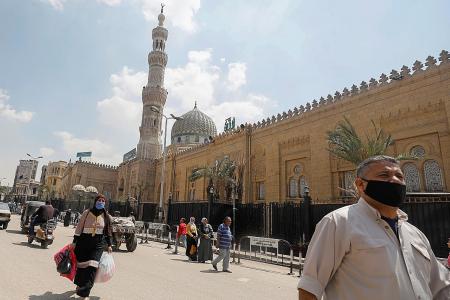Coronavirus casts shadow of isolation and gloom in Islamic world
ALGIERS/CAIRO/JAKARTA: Days before the fasting month of Ramadan, Muslims are grappling with an untimely paradox of the coronavirus pandemic: Separation at a time when socialising is almost sacred.
The holiest month in the Islamic calendar is one of family and togetherness - community, reflection, charity and prayer.
But with shuttered mosques, coronavirus curfews and bans on mass prayers from Senegal to South-east Asia, some 1.8 billion Muslims are facing a Ramadan like never before.
The pandemic has generated new levels of anxiety ahead of Ramadan, which begins on Friday.
In Algiers, Madam Yamine Hermache, 67, usually receives relatives and neighbours at her home for tea and cold drinks during the month.
But this year she fears it will be different.
"We may not visit them, and they will not come," she said, weeping. "The coronavirus has made everyone afraid, even of distinguished guests."
In a country where mosques have been closed, her husband Mohamed Djemoudi, 73, worries about something else.
"I cannot imagine Ramadan without tarawih," he said, referring to additional prayers performed at mosques after iftar, the evening meal in which Muslims break their fast.
In Jordan, the government, in coordination with neighbouring Arab countries, is expected to announce a fatwa outlining what Ramadan rituals will be permitted.
Around the souks and streets of Cairo, a city of 23 million people that normally never sleeps, the virus has been disastrous.
"People don't want to visit the shops, they are scared of the disease. It is the worst year ever," said Mr Samir El-Khatib, who runs a stall next to the historic Al-Sayeda Zainab mosque.
"Compared with last year, we haven't even sold a quarter."
During Ramadan, traders stack their tables with dates and apricots, and traditional lanterns known as fawanees.
But this year, with a night curfew and banned communal prayers, people do not see much point in buying the lanterns.
Meanwhile in Indonesia, some people will be meeting loved ones remotely this year.
Mr Prabowo said he will host Eid al-Fitr, the celebration at the end of the fasting month, via the online meeting site Zoom .
"I worry about the coronavirus," he said.
"But all kinds of togetherness will be missed. No iftar together, no praying together at the mosque, and not even gossiping with friends." - REUTERS
Get The New Paper on your phone with the free TNP app. Download from the Apple App Store or Google Play Store now


